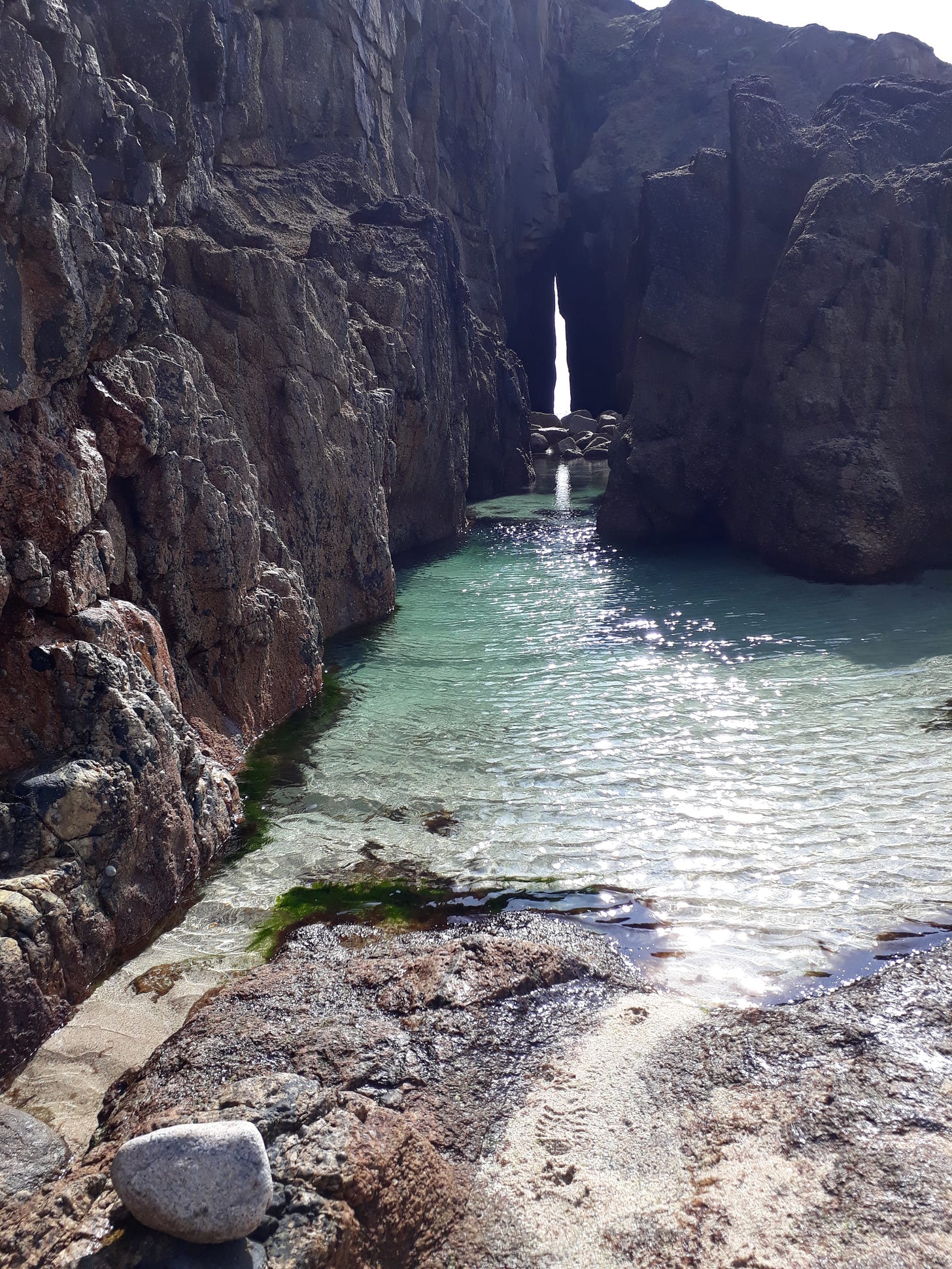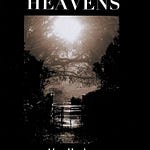To Begin Again
I speak to you now from an elm topped desk that spans a sash window of a ground floor flat, looking out at a fruitless quince and a pear tree the blackbirds always get to first. The elm top is a two inch thick, two foot wide, yard long end of a plank I spirited away from the leftovers of a chair making commission twelve or more years ago. It’s bolted to the top of a small kitchen table frame and where I’ve written ever since.
I am looking at the elm top now. The straighter outer grain are somewhere between oak and ash, the heart of this piece has always reminded me of walnut. It swims around an archipelago of five branch bases. Each has its own landscape shaped by the light and movement of the tree’s unique life. When I touch it, I remember carving chair seats from further up the plank. Elm is a ‘forgiving’ wood, to well honed blades it yields in buttery swirls.
And why am I starting this inaugural post on Substack with this piece of wood? Because sitting in front of the elm, writing, is one end of many Salmon Paths I hope will become clearer as we go this way together. It is the path to here that kept on returning, amongst many navigations out into the endless.
I had been a high achieving eleven-year-old kid, who secured a scholarship to an independent school. But five years later, a month after my sixteenth birthday, in January, 1980, I found myself being delivered to school by the local truant officer. I had been a compulsive truant since age twelve or so, wandering mostly through London, in parks, woodlands and commons or spending my bus fares on long rides across the Thames to wander the day out, walking the miles home in time to appear as though arriving back from school. With a catalogue of parental mental health issues, the litany of new, prescribed and addictive drugs, meted out by psychiatrists and being field tested in our home; along with our own unique and inevitably traumatic transgenerational circumstance, things had gone very awry.
By Easter of that year, the authorities had let me go. I stood on the threshold of my adult life ~ a boy. My secondary education had failed me, only adding to my difficulties. At the time, I remember holding the one ‘O’ Level certificate for English, that I’d got aged fourteen, feeling like the whole thing had been a sick joke I didn’t really get.
For the last forty- four years, I have survived from manual work. This has had many, many forms and found me in some extraordinary situations. From greengrocery and labouring to fighting fires in mid-eighties Docklands, driving trucks across the U.S. and working in the film industry in Hollywood. I collected recycling, made yurts and sold Christmas trees in Brighton and worked as a farm hand in Sussex. After I moved west, to live near the Severn River, I made chairs, managed woodland, lay hedges and taught all three. For the last eleven years, I have been a landscaper. In these travels and travails are many pictures that I’ll return to within a strand of Salmon Paths, that stretch across decades of surviving on what passes through the hands.
I found my way back to reading when many around me, who had followed a more conventional route, were deciding to take a well-earned break from books. Or, at least, prescribed reading lists. I was twenty-one and working as a firefighter in Deptford, the London dockland on the southern banks of the Thames, a couple of miles east of Tower Bridge. Although the previous decade had been a wasteland of wrong turns and troubles, somewhere, I was still in there.
This initiated my auto didactic journey, a path of learning that I have followed throughout my life of one book leading to the next, choosing people and friendships with mentors and guides who taught me ways of seeing whilst laying other reading in front of me. It may not have been the standard canon, but it was mine. I may not always be able to wave a flag of common reference from a more traditional schooling or, indeed tick certain boxes of belonging. It made me just this way.
Along with the reading, almost simultaneously, came the notebooks. They happened instinctually, falteringly at first, sporadic at best but, even so, my pocket became inhabited with notes and attempts at sentences scratched in these A6, wide lined, pocketable books. As the world began opening up to me, the first stuttered lines began to blacken blank pages. Looking again, at the few that survived those times, that blackening was hefted with the anger and despair of a young man who was not coming to terms with the recent and sudden death of his father or with living a life that he simply didn’t feel he belonged to or that belonged to him. Add to that the bitter disappointment and dismay of witnessing the revolution of mass privatisation in eighties Britain, it wasn’t long before I bought a round-the-world ticket, handed in my resignation at the London Fire Brigade and, like so many I subsequently met out on the backpacking trail, left Thatcher’s Britain with no intention of ever returning. Life was, definitively, always going to be elsewhere.
Yes, the weather. I have almost exclusively spent my life working outside and I have found it has its own way of teaching, of speaking and reaching an understanding of how we need to be together. It was the weather though wasn’t it? The weather, something with the weather. Six years ago, the IPCC reported on the climate emergency, the troubles were here, in plain sight, for all to see, or not, or ignore, or deny, or simply sit in a stunned and silent paralysis.
Thankfully though, for some in this little town where I live, to act, and it was here that a few folk birthed Extinction Rebellion, a movement that in the following year, well, I’m sure you know the story.
While folk readied themselves to occupy the bridges over the Thames, I chose to seek guidance from the land I went to each morning to run our dog. Utilising nature-based practices, I particularly listened to a small waterfall there. I asked it questions and listened, carefully, intently. It was, unsurprisingly I suppose, an education in the dynamics of ‘flow’ and slowly, I made this conversation into a piece of work. And as I did, I realised that the most ecologically regenerative path that I could follow and role model to my then teenage sons, was to make another attempt at realising the dream of my own life, to explore the soul’s genius.
So, I sent an application to the Creative Writing MA at Bathspa University. I’d sent a portfolio and we took a turn around the floor to an offer. I kicked off my work boots and, barefoot and open armed, walked into the academy at Corsham Court, a Wiltshire country seat and the old Bath Art School, precisely twenty years since first sitting around a table in Sussex University, studying Creative Writing with Ros Barber, who you’ll find here on Substack Writing a Better World ; with a simple dream, to be here, now, at this elm topped table, pen in hand, writing this to you.
And so it began, another seminar room, in a country house, the estate disappearing away timelessly through the window, in a broad avenue of centuries old oaks with sheep grazing below. I had been out in the ocean such a long time, with so many rivers coursed, and cursed, in flow and counter currents. I had given up so many times. And some of that water stayed with me until, sitting in this last seminar room, introducing ourselves by answering the question, “What brought you here?”…
It rose in a flood and, gathered together with seven surprised and awkward strangers, I wept. I simply wept. It was a life changing year.
That was four years ago. In that time, I have completed a writing residency, been published variously, placed in a poetry prize and shortlisted for another. I’ve recorded my work on an album, taught and submitted to literary magazines and journals. I’ve read in public many times. In short, these last years have been spent, as time and tool work allowed, here at the elm top desk, living the dream of my life. As time allowed because, on receiving the MA, my boys were still teenagers at school and college. With lockdown and other teenage tragedies and challenges for them to face, I continued landscaping, taking care of them through some hard times and supporting them to the end of their mandatory schooling, with tickets enough to choose further education if they felt it served them. I kept providing to the end of our chapter, with both raised to young men and heading out into the adult world. Now, here we are, in a year of endings and new beginnings, of more leavings and returns. What else is there, once your duty’s done, but to contribute the best of us? And this is mine, for better or worse.
My cultural awakening as a teen was into Punk and DIY culture, the anarchy of that, of simply getting up and doing whatever you wanted to change the story. That thread has stayed with me ever since. So, when Juliette Moreton, another poet I work with regularly, sent me a post from her Substack, Source Material, I began to look more deeply into the platform and that anarchic thread got caught and pulled.
One of the primary reasons I am making Salmon Paths is to connect my writing directly with readers and listeners, a simple space between us. It is this anarchic thread that has attracted me to Substack, simply my work going out there, to a community of readers with no gatekeepers to define or mediate the edges of the experience. There’s just us in this field and, for my part, it’s the only way, after downing tools this last Spring, I have to make. I stand before you with open arms and empty pockets, taking this leap into the unknown, upriver, over fears and doubt with a deep sense of gratitude, of grace, for making it this far alive and holding faith with this lifelong homing instinct that brought me to this table, now.
Salmon Paths, unsurprisingly, are stories of return, but in multiple directions. You can expect poems, prose poems, non-fiction, creative or otherwise and essays, some lyrical I hope. And for those who prefer to listen, each post will also come as an audio recording. Although I will front load a few previously published pieces in the early stages to give you an idea of it, and me, I’m reckoning I’ll post something to you every fortnight. Although, as this is just starting, that frequency might change as things even out.
In the spirit of The Commons, you will be able to read everything I publish for free. But also, in the spirit of Substack, I am asking you to support me in my making by recommending and sharing with other people. There is a monthly subscription available for £5, an annual one at £50 and a founding member for £100. And that, dear reader, is the real game changer for this writer. This is the only work I have and with three hundred or so folk deciding to support me for the price of less than a pint at the local, I can continue making my work full time and that is the only dream worth living.
I do hope that you enjoy Salmon Paths and I look forward to the travels, songs and yarns we share from here. Thank you for being here. So, well, on we go.













Share this post